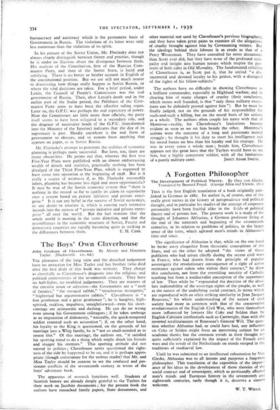The Boys' Own Claverhouse
John Graham of Claverhouse. By Alistair and Henrietta Tayler. (Duckworth. 12s. 6d.) THE pleasures of the long view and the detached judgement have no attraction for Miss Tayler and her brother (who died after the first draft of this book was written). They charge as cheerfully as Claverhouse's dragoons into the religion; and political controversies of the seventeenth century. They have no half-lights, no modified judgements. They are masters of the emotive noun or adjective—the Covenanters are a " mob of fanatics," " the enraged rabble," " treacherous insurgents," " frightened but argumentative rabbits." Claverhouse is " a fine gentleman and a great gentleman "; he is haughty, high- spirited, reckless, impulsive, straightforward--even his short- comings are aristocratic and dashing. He can do no wrong even among his Government colleagues ; if he takes umbrage at an imputation of dishonesty, " naturally, the quick-tempered soldier resented such an accusation "; if, on the other hand, his loyalty to the King is questioned, on the grounds of his marriage into a Whig family, he is " not so small-minded as to resent this." Of this marriage, the authors say, " it satisfied his sporting mind to do a thing which might shock his friends and stagger his enemies." This sporting attitude did not extend to politics ; Claverhouse never questioned the right- ness of the side he happened to be on, and it is perhaps appro- priate (though unfortunate for the serious reader) that Mr. and Miss Tayler should be content to see the confused and pas- sionate conflicts of the seventeenth century in terms of the boys' adventure book.
The apparatus of research functions well. Students of Scottish history are already deeply grateful to the Taylers for their work on Jacobite documents ; for the present book the authors have ransacked family papers, State documents, and
other material not used by Claverhouse's previous biographers, and they have taken great pains to examine all the allegations of cruelty brought against him by Covenanting writers. But the ideology behind their labours is as crude as that of a Percy Westerman. They have consulted far more document than Scott ever did, but they have none of the profound sym- pathy and insight into human nature which inspire the por traits of both sides in Old Mortality. The fundamental criticisr., of Claverhouse is, as Scott put it, that he united "a
di -
interested and devoted loyalty to his prince, with a disregard of the rights of his fellow-subjects."
The authors have no difficulty in showing Claverhouse as a brilliant commander, especially in Highland warfare, and in clearing him of many charges of cruelty (their conclusion, which seems well founded, is that "only three military execu- tions can be definitely proved against him "). But he must be finally judged, not on the grounds of his responsibility for such-and-such a killing, but on the moral basis of his actions as a whole. The authors often couple his name with that of Montrose—rashly, for Claverhouse's limitations become evident as soon as we set him beside the other. Montrose's actions were the outcome of a long and passionate mental struggle ; he thought it his duty to exert his intelligence and his moral forces no less than his loyalty and his courage. He was in every sense a whole man ; beside him, Claverhouse appears not the great hero that the Taylers would have us see him, but a highly competent soldier, with all the limitations


































 Previous page
Previous page